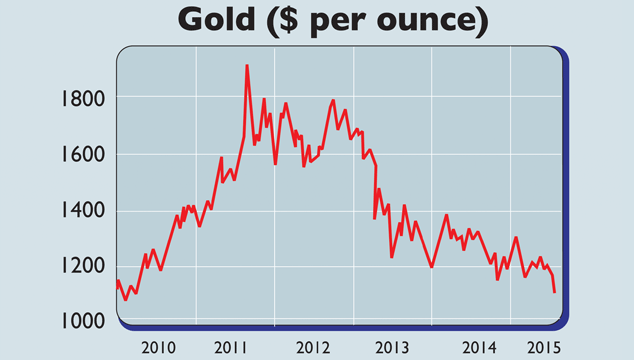Gold plunges to five-year low
Goldbugs have had a nasty week – gold has slumped to around $1,100 an ounce.

Get the latest financial news, insights and expert analysis from our award-winning MoneyWeek team, to help you understand what really matters when it comes to your finances.
You are now subscribed
Your newsletter sign-up was successful
Want to add more newsletters?

Twice daily
MoneyWeek
Get the latest financial news, insights and expert analysis from our award-winning MoneyWeek team, to help you understand what really matters when it comes to your finances.

Four times a week
Look After My Bills
Sign up to our free money-saving newsletter, filled with the latest news and expert advice to help you find the best tips and deals for managing your bills. Start saving today!

Goldbugs have had a nasty week goldhas slumped to a five-year low around $1,100 an ounce.The price slid by 4.2% on Monday alone its worst day in two years as heavy selling on US and Chinese commodity futures exchanges saw more than $1.7bn-worth dumped on the market in a few minutes. Gold has fallen 42% from its record peak over $1,920, set in September 2011.
The sharp plunge is being put down to a bear raid, or a deliberate attack by short sellers eager to test new lows. They were "pushing on an open door", saysAlistair Osborne in The Times. They struck during Asian trading hours when Europeans and Americans were asleep. So the relatively small market was even less liquid than usual, making it vulnerable to sudden slides.
Electronic trading systems then compounded the initial sell-off because gold had fallen through a certain threshold (around $1,100) at which automatic stop-losses kick in for many traders. That triggered a cascade of selling. "This sudden drop during Asian trading seemed to have been triggeredby some stop-loss sell-offs that have nothing to do with fundamentals,"says Wallace Ng of Gemsha Metals.
MoneyWeek
Subscribe to MoneyWeek today and get your first six magazine issues absolutely FREE

Sign up to Money Morning
Don't miss the latest investment and personal finances news, market analysis, plus money-saving tips with our free twice-daily newsletter
Don't miss the latest investment and personal finances news, market analysis, plus money-saving tips with our free twice-daily newsletter
China disappoints the goldbugs
Given that China has amassed vast foreign-exchange reserves, investors thought it might have spent a lot more on gold. It wants the yuan to be taken seriously as a global reserve currency and the major economies all have substantial gold holdings notably the US, with a world-beating 8,133 tonnes. However, it may have had trouble deploying its billions of reserves into gold without driving up the price significantly, as the market is so small. But the upshot is thatChina has left the door open to further buys, "which should limit the downside for gold", says Joni Teves of UBS.
Good news is bad news for gold
The main problem for gold, however, is that "a turn in the monetary cycle may at last be on the cards", says the FT. The US (and the UK) central banks are gradually preparing for higher interest rates. As gold pays no interest, it looks less appealing when the yield on other assets climbs.
More broadly, gradual normalisation of monetary policy reflects an improving economy, and gold prefers instability and weakness. And the impending rise in US rates is being accompanied by a stronger dollar, which also hampers gold because it is priced in dollars. A stronger greenback also makes it pricier for holders of other currencies. While we continue to suggest holding 5%-10% of your portfolio in gold as insurance, for now it looks set to go nowhere.
Get the latest financial news, insights and expert analysis from our award-winning MoneyWeek team, to help you understand what really matters when it comes to your finances.

-
 UK unemployment hits highest level since 2021 – will interest rate cuts follow?
UK unemployment hits highest level since 2021 – will interest rate cuts follow?UK unemployment reached its highest rate in almost five years by the end of 2025. Is AI to blame and will the Bank of England step in with an interest rate cut in March?
-
 Did UK inflation fall in January?
Did UK inflation fall in January?After rising in December, analysts expect the next round of UK inflation data to show that disinflation returned in January